Valplast Flexible Partial Denture
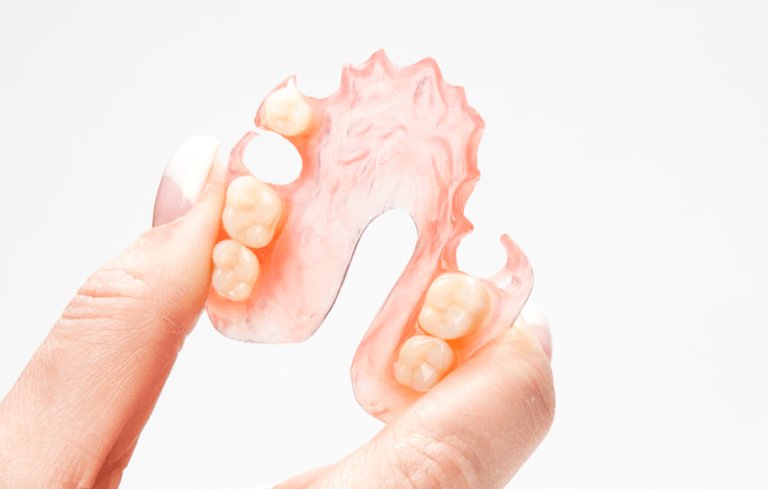
What Is A Valplast Flexible Partial Denture?
A Valplast Flexible Partial Denture is a type of removable partial dental prosthesis specifically designed to fill gaps left by missing teeth. It offers a flexible and lightweight alternative to traditional partial dentures, which are usually made from rigid acrylic materials. The Valplast denture is constructed using a special biocompatible nylon thermoplastic material, which not only makes it durable but also allows for a more comfortable fit within the mouth.
The name “Valplast” is derived from the patented material used in its construction, and it has been used successfully for many years in dental practices worldwide. This innovative denture design has gained popularity among dental patients due to its excellent esthetics, functionality, and ease of use.
Before deciding on whether A Valplast Flexible Partial Denture are right for you, there are some things you should know:
- Who Needs A Valplast Flexible Partial Denture?
- What Are The Advantages Of A Valplast Flexible Partial Denture?
- What Are The Alternative Treatments If I Do Not Choose A Valplast Flexible Partial Denture?
- How Much Does A Valplast Flexible Partial Denture Cost?
- What Are The Steps In The Valplast Flexible Partial Denture Procedure?
- Can I Have A Valplast Flexible Partial Denture If I Am Pregnant?
- How Long Does A Valplast Flexible Partial Denture Last?
- What Are Common Problems with A Valplast Flexible Partial Denture?
If you have any further questions about A Valplast Flexible Partial Denture or other dental services offered at Atlas Dental, please contact us.

Free Phone Consultation
Have questions about cosmetic dentures for missing teeth? Book a free phone consult with our Toronto dentist

5 star google reviews
Our patients love their cosmetic looking denture smile! See for yourself why patients choose Atlas Dental.

Book a denture appointment online
We make custom fitted dentures to help our patients smile confidently again.
Who Needs A Valplast Flexible Partial Denture?
Valplast flexible partial dentures can be an ideal tooth replacement option for a wide range of individuals who are missing one or more teeth. If you find yourself in any of the following situations, a Valplast flexible partial denture may be the right solution for you:
- Missing Teeth: When one or more teeth are missing, it can lead to difficulties in chewing, speech impediments, and a lack of confidence in your appearance. A Valplast denture can fill these gaps, restoring your ability to eat comfortably and speak clearly.
- Preserving Natural Teeth: Preserving the integrity of your remaining natural teeth is crucial for maintaining oral health. If you have a few missing teeth and leave the gaps untreated, it can cause the adjacent teeth to shift and move, potentially leading to alignment issues and bite problems. A Valplast denture prevents this movement, supporting the adjacent teeth and keeping them in their proper positions.
- Affordable Tooth Replacement: Compared to dental implants or fixed bridges, Valplast dentures are a more cost-effective tooth replacement option. They offer an affordable solution to replace missing teeth without compromising on functionality or aesthetics.
- Non-Candidates for Dental Implants: Some individuals may not be suitable candidates for dental implants due to factors such as inadequate bone density or certain medical conditions. In such cases, a Valplast denture can be an excellent alternative for restoring their smile and oral function.
- Temporary Tooth Replacement: If you are undergoing a dental treatment plan that involves multiple steps, a Valplast denture can serve as a temporary tooth replacement until the permanent solution, like a dental implant, can be placed.
- Improved Aesthetics: A Valplast denture not only restores missing teeth but also enhances the aesthetics of your smile. The prosthesis is custom-made to match the color, shape, and size of your existing teeth, creating a natural and seamless appearance.
- Boosted Self-Confidence: Regaining your smile can have a significant impact on your self-confidence and overall well-being. With a Valplast denture, you can confidently interact with others without worrying about hiding your missing teeth.
It’s essential to consult with a qualified dentist or prosthodontist to determine if a Valplast denture is the right choice for your specific dental needs. They will conduct a comprehensive examination of your oral health, discuss your treatment goals, and help you make an informed decision about the most suitable tooth replacement option. If you have further questions about Valplast Flexible Dentures, please contact us.
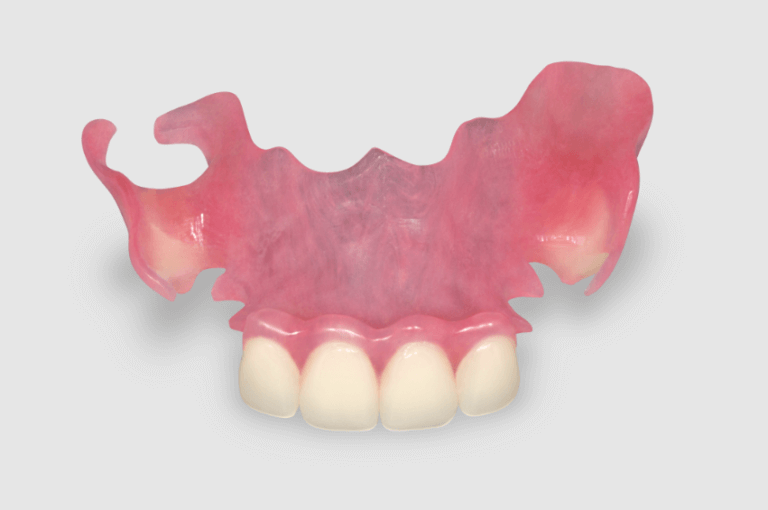
What Are The Advantages Of A Valplast Flexible Partial Denture?
Valplast flexible partial dentures offer numerous advantages that set them apart from traditional rigid denture options:
- Natural Appearance: Valplast flexible partial dentures are carefully crafted to blend seamlessly with your natural teeth and gums. The denture’s translucent and gum-colored material ensures a discreet and natural look, allowing you to smile with confidence.
- Comfortable Fit: The flexibility of Valplast dentures allows them to conform to the unique contours of your mouth. This feature ensures a comfortable fit, reducing the likelihood of irritation and sore spots often associated with traditional rigid dentures.
- Metal-Free: Unlike conventional partial dentures that may contain metal clasps, Valplast dentures are completely metal-free. This eliminates the risk of allergic reactions to metal materials, making them an excellent choice for individuals with metal sensitivities.
- Durable and Lightweight: Valplast dentures are constructed from a durable, high-quality nylon thermoplastic material, making them both robust and lightweight. The dentures can withstand daily wear and tear without compromising on their flexibility or strength.
- Non-Invasive: The process of getting Valplast flexible partial dentures is non-invasive and generally requires minimal alteration to your existing teeth. It is a reversible option, allowing you to explore other tooth replacement options in the future if needed.
- Enhanced Speech: Valplast dentures offer improved speech capabilities compared to some other tooth replacement options. With a secure and comfortable fit, you can speak confidently without worrying about denture movement affecting your speech.
- Preserves Remaining Teeth: By filling the gaps left by missing teeth, Valplast flexible partial dentures help maintain the alignment and integrity of your remaining natural teeth. This prevents neighboring teeth from shifting and potentially causing further dental issues.
- Quick Turnaround: The fabrication process for Valplast dentures is often faster than that of some other tooth replacement options, making them an attractive choice for individuals looking for a swift solution to their missing teeth.
- Cost-Effective: Valplast dentures offer an affordable tooth replacement option without compromising on esthetics or functionality. They provide an excellent balance between quality and cost-effectiveness.
- Easy Maintenance: Cleaning and maintaining Valplast flexible partial dentures is relatively straightforward. Regular brushing and rinsing, along with occasional professional cleaning, can keep them in optimal condition.
While Valplast flexible partial dentures have numerous advantages, it’s essential to consider your specific dental needs and consult with your dentist before making a decision. They can guide you through the process, explain the treatment plan, and ensure that Valplast dentures are the most suitable choice for your individual oral health requirements. If you have further questions about Valplast Flexible Dentures, please contact us.
What Are The Alternative Treatments If I Do Not Choose A Valplast Flexible Partial Denture?
If you decide that a Valplast flexible partial denture is not the right option for you, there are several alternative treatments available to address your missing teeth. Each alternative has its own advantages and considerations, depending on your individual dental needs and preferences:
- Acrylic Partial Denture: Acrylic partial dentures are a more traditional and cost-effective option for replacing missing teeth. These dentures are made from a pink acrylic base that mimics the appearance of gums and holds replacement teeth. While they can be a temporary solution, they may not offer the same level of comfort and durability sturdier dentures.
- Cast Partial Denture: Cast partial dentures are made from metal frameworks with clasps that attach to remaining natural teeth, providing stability and support. These dentures are durable and offer a more precise fit than acrylic partial dentures. However, the metal clasps might be visible when you smile, making them less aesthetically pleasing.
- Single Tooth Denture (Flipper): A single tooth denture, commonly known as a “flipper,” is designed to replace a single missing tooth. It consists of a removable acrylic tooth attached to a pink acrylic base. While flippers are affordable and quick to fabricate, they are not as secure or long-lasting as other alternatives.
- Essix Denture: An Essix denture is a clear, transparent, and removable dental appliance made from a thin plastic material. It fits snugly over your existing teeth, replacing the missing ones. Essix dentures are often used as temporary solutions and are less noticeable than traditional dentures, but they may not be as durable as other options.
- Dental Implants: Dental implants are a permanent and highly effective solution for replacing missing teeth. A dental implant is a titanium post surgically inserted into the jawbone, acting as an artificial tooth root. A crown is then attached to the implant, providing a natural-looking and functional replacement tooth. Dental implants offer the most stable and long-lasting option but may require sufficient bone density and a more extensive treatment process.
- Dental Bridges: Dental bridges are fixed restorations that bridge the gap between missing teeth. They are supported by crowns placed on the adjacent natural teeth. Bridges are a reliable option for tooth replacement, but they require modifying the neighboring teeth to accommodate the crowns.
- No Treatment: While not a recommended long-term option, some individuals choose not to pursue any dental treatment for their missing teeth. Leaving gaps in your smile can lead to dental problems over time, such as shifting teeth, bite issues, and bone loss in the jaw.
When considering alternative treatments, it’s crucial to consult with your dentist to discuss your specific dental needs, budget, and treatment goals. They can guide you through the pros and cons of each option, helping you make an informed decision about the best treatment plan for restoring your smile and maintaining optimal oral health. If you have further questions about Valplast Flexible Dentures, please contact us.
Cost of Partial Dentures
Partial Dentures can vary widely in cost depending on several factors, including the type of partial denture, whether it is for the upper or lower jaw, the materials used, and the location of the dental practice. Therefore, depending on the type of denture you are looking for, the cost can range from $462 to $1419 plus dental lab fee. The codes relevant to dentures in the Ontario Dental Association’s Suggested Fee Guide appear as follows:
Dentures, Partial, Acrylic Base (Provisional) (With or Without Clasps). (e.g. Single Tooth Dentures, Essix Dentures)
- 52101 – Maxillary: $462 + Dental Lab Fee
- 52102 – Mandibular: $462 + Dental Lab Fee
Dentures, Partial, Polymer, Resilient Retainer. (e.g. Valplast Flexible Partial Dentures)
- 52201 – Maxillary: $678 + Dental Lab Fee
- 52202 – Mandibular: $678 + Dental Lab Fee
Dentures, Partial, Acrylic, With Metal Wrought/Cast Clasps and/or Rests. (e.g. Acrylic Partial Dentures)
- 52301 – Maxillary: $775 + Dental Lab Fee
- 52302 – Mandibular: $775 + Dental Lab Fee
Dentures, Partial, Free End, Cast Frame/Connector, Clasps and Rests. (e.g. Cast partial Dentures)
- 53101 – Maxillary: $1419 + Dental Lab Fee
- 53102 – Mandibular: $1419 + Dental Lab Fee
Dentures, Partial, Tooth-Borne, Cast Frame/Connector, Clasps and Rests. (e.g. Cast partial Dentures)
- 53201 – Maxillary: $1319 + Dental Lab Fee
- 53202 – Mandibular: $1319 + Dental Lab Fee
Partial Dentures are sometimes considered a supplementary service by dental insurance plans and may or may not be covered by your dental insurance. Be sure to find out from your dental insurance plan provider how much you are eligible for before going ahead with dental treatment. Your dentist can help you submit an predetermination to your dental insurance. Our fees are consistent with the ODA Fee Guide.
For patients without dental insurance, Atlas Dental is pleased to offer dental financing through Dentalcard. Affordable payment plans start at 7.95% for terms of 6 months to 6 years. To learn more about Dentalcard dental treatment financing, follow this link.
What Are The Steps In The Valplast Flexible Partial Denture Procedure?
The process of getting a Valplast denture involves several steps, from the initial consultation to the final placement of the prosthesis:
- Initial Consultation: The first step is to schedule an appointment with a dentist for a thorough examination of your oral health. During this consultation, the dental professional will assess the condition of your teeth, gums, and jawbone, as well as discuss your treatment goals and preferences.
- Treatment Planning: Based on the examination results and your dental needs, the dentist will develop a personalized treatment plan. They will explain the different types of partial dentures available and help you choose the most suitable option for your situation.
- Taking Impressions: To create a custom-fit Valplast denture, the dentist will take precise impressions of your teeth and gums. These impressions serve as a mold for designing the denture, ensuring a comfortable and accurate fit. Please review these denture pre-visit instructions before your appointment.
- Try-In Appointment: Once the Valplast denture is fabricated, you will have a try-in appointment. During this visit, the dentist will check the fit, shape, and color of the denture to ensure it aligns perfectly with your natural teeth and gums. Any necessary adjustments will be made at this stage.
- Final Placement: After any adjustments are completed, your dentist will place the final Valplast denture. They will carefully position it in your mouth and check that it fits comfortably and securely. The dentist will also provide denture post-insertion instructions on how to insert and remove the denture properly, as well as how to care for it.
- Follow-Up Visits: After receiving your Valplast denture, you will have follow-up appointments to ensure that the denture fits well and functions correctly. Your dentist may make additional adjustments if needed, especially in the initial period of wearing the denture.
By following these steps and working closely with your dental professional, you can achieve a well-fitting and functional Valplast denture that seamlessly integrates with your natural smile. If you have further questions about Valplast dentures, please contact us.
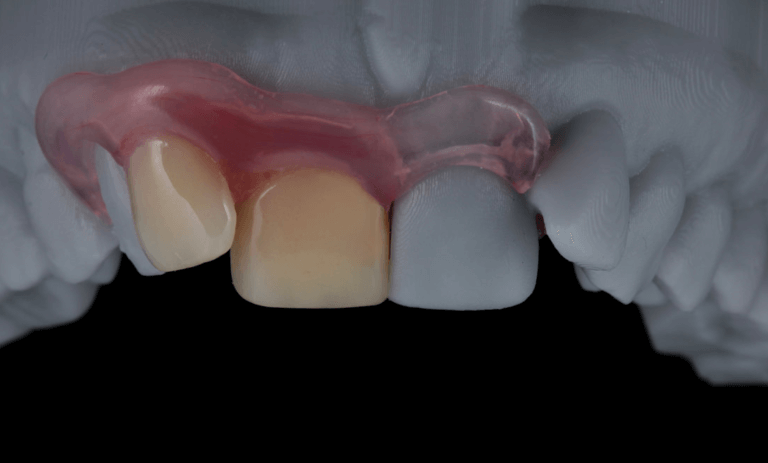
Can I Have A Valplast Flexible Partial Denture If I Am Pregnant?
Pregnancy is a unique and special time in a woman’s life, and taking care of oral health during this period is essential for both the mother and the baby. Many dental treatments are safe during pregnancy, but certain factors need consideration when it comes to getting a Valplast denture. Here’s what you should know about having a Valplast denture if you are pregnant:
- Consultation with Your Dentist: If you are pregnant and considering a Valplast denture, it is crucial to inform your dentist about your pregnancy during your initial consultation. This information allows the dentist to tailor the treatment plan and choose the safest approach for your specific situation.
- Timing of Treatment: Pregnancy, particularly the first and third trimesters, can be sensitive periods for dental treatments due to potential risks involved. Elective dental procedures, such as getting a Valplast denture for cosmetic purposes, are often best postponed until after delivery. However, if there is a pressing need to replace missing teeth or address oral health issues, your dentist may recommend the most appropriate and safe course of action during pregnancy.
- Local Anesthetics and X-Rays: During pregnancy, avoiding unnecessary exposure to medications and X-rays is advisable. However, local anesthetics are generally considered safe for dental procedures, as long as they do not contain epinephrine. Your dentist will use an anesthetic that is safe for use during pregnancy.
- Considering Alternatives: If the timing of the Valplast denture treatment is not ideal during your pregnancy, your dentist may suggest temporary solutions or alternative treatments that can be safely done during this period. These temporary measures can provide relief until a more comprehensive treatment can be pursued after delivery.
- Oral Health and Pregnancy Outcomes: Research suggests that maintaining good oral health during pregnancy is linked to better pregnancy outcomes. Poor oral health has been associated with an increased risk of preterm birth and low birth weight. Thus, it is essential to prioritize your oral health and work with your dentist to develop a suitable dental care plan during pregnancy.
Having a Valplast denture during pregnancy is possible, but it requires careful consideration and communication with your dentist. Your dental professional will take into account your unique situation and ensure that any treatment provided is safe for both you and your developing baby. If you have further questions about Valplast dentures, please contact us.
How Long Does A Valplast Flexible Partial Denture Last?
On average, a well-maintained Valplast denture can last anywhere from 5 to 15 years or even longer. The lifespan of a Valplast flexible partial denture can vary depending on several factors:
- Quality of Material: Valplast dentures are made from high-quality, durable nylon thermoplastic material. The premium materials used in their construction contribute to their longevity and resistance to wear and tear.
- Oral Hygiene: Proper oral hygiene practices are crucial for extending the lifespan of your Valplast denture. Regularly brush the denture using a soft brush and non-abrasive toothpaste to keep it clean and free from debris. Avoid using abrasive or harsh chemicals on your Valplast denture, as they can damage the material. Instead, opt for mild denture cleaners recommended by your dentist.
- Removing Denture at Night: Taking your Valplast denture out at night and giving your mouth a rest can help prolong its life. This practice also allows you to clean your denture thoroughly.
- Proper Storage: When not in use, store your Valplast denture in a denture case filled with water to prevent it from drying out and losing its shape.
- Preventing Damage: Be mindful of activities that could potentially damage the denture, such as chewing on hard objects or using your teeth to open packages. Avoid exposing the denture to high temperatures.
- Regular Dental Check-Ups: Attend regular dental check-ups so that your dentist can monitor the condition of your Valplast denture and make any necessary adjustments or repairs.
Despite their durability, Valplast flexible partial dentures may require replacement over time due to natural wear and tear, changes in your mouth’s shape, or any significant dental changes. Additionally, as your mouth changes, your dental prosthesis may need adjustments or relining to maintain a proper fit. If you notice any cracks, chips, or changes in the fit of your Valplast denture, it is essential to schedule an appointment with your dentist promptly. If you have further questions about Valplast Flexible Dentures, please contact us.
What Are Common Problems with A Valplast Flexible Partial Denture?
Valplast flexible partial dentures are generally reliable and well-tolerated by most patients. However, like any dental prosthesis, they can encounter certain issues over time. Being aware of common problems that may arise with Valplast dentures can help you address them promptly and maintain the longevity of your dental restoration:
- Fractures or Tears: Although Valplast dentures are durable, they can still be susceptible to fractures or tears, especially if exposed to excessive force or pressure. Biting on hard objects or aggressive chewing can lead to damage. If you notice any cracks, chips, or tears in your denture, it is essential to contact your dentist for repair or replacement.
- Poor Fit: Over time, changes in your mouth’s shape or surrounding tissues may affect the fit of your Valplast denture. A poor fit can lead to discomfort, irritation, and difficulty speaking or eating. Regular dental check-ups can help identify any fit issues early on, and your dentist can make necessary adjustments.
- Allergic Reactions: While Valplast dentures are designed to be biocompatible, some individuals may experience allergic reactions to the materials used. If you notice signs of irritation, redness, or unusual discomfort, consult your dentist to determine if an allergic reaction is the cause.
- Odor or Staining: Valplast dentures are resistant to stains and odors, but they are not entirely immune to discoloration over time. Improper cleaning, tobacco use, or consuming certain foods and beverages can lead to staining or odors. Regularly clean your denture and follow your dentist’s cleaning recommendations to prevent such issues.
- Gum Irritation: In some cases, the clasps or connectors that attach the Valplast denture to your natural teeth can cause minor gum irritation or sore spots. Your dentist can adjust or modify the clasps to alleviate any discomfort.
- Loss of Retention: Over time, the clasps or connectors on your Valplast denture might lose their ability to hold the denture securely in place. Regular dental check-ups allow your dentist to assess the retention and make any necessary adjustments.
If you encounter any of these problems with your Valplast flexible partial denture, do not attempt to fix them yourself. Instead, schedule an appointment with your dentist for proper evaluation and necessary repairs. Early detection and timely maintenance can help prevent more significant issues and ensure your denture continues to function optimally. If you have further questions about Valplast Flexible Dentures, please contact us.
We also think you’ll like…
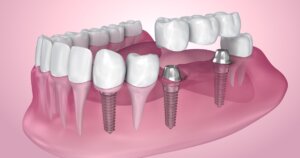
Dental Implant Crown
Dental Implant Crown What Is A Dental Implant Crown? A Dental Implant Crown is a crucial component of a dental implant, which is a permanent
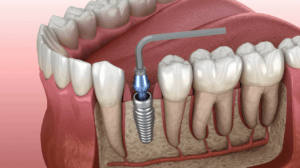
Immediate Dental Implant Placement
Immediate Dental Implant Placement What Is Immediate Dental Implant Placement? Immediate Dental Implant Placement is a revolutionary approach towards dental implants that offers numerous advantages
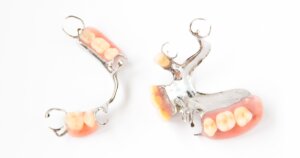
Denture Reline
Denture Reline What Is A Denture Reline? As time goes by, Dentures, the removable prosthetic teeth used to replace missing teeth, can start to lose

Endosteal Dental Implant
Endosteal Dental Implant What Is An Endosteal Dental Implant? Endosteal Dental Implants stand as a revolutionary solution for restoring smiles and dental functionality. These implants

Dental Implants
Dental Implants What are Dental Implants? Dental Implants are revolutionary replacements for missing teeth that not only look and feel like natural teeth but also
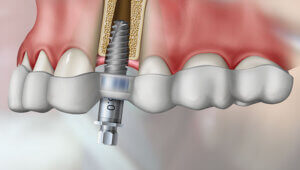
Computer Guided Dental Implant Surgery
Computer Guided Dental Implant Surgery What Is Computer Guided Dental Implant Surgery? Computer guided dental implant surgery is a specialized technique that employs advanced computer

